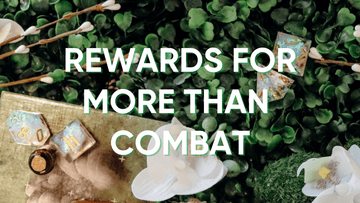When we think of rewards in Dungeons & Dragons, the first things that often come to mind are weapons, armor, or magical items designed for combat. While these are important, they’re far from the only way to reward players. Designing rewards that impact other areas of gameplay—like social encounters, exploration, or character development—can enrich the role-playing experience and make your world feel deeper and more dynamic.
In this blog post, we’ll explore how to design meaningful, non-combat rewards that resonate with your players and their characters.
Why Non-Combat Rewards Matter
Combat is only one pillar of D&D gameplay; social interaction, exploration, and personal storytelling are equally important. Non-combat rewards:
- Encourage role-playing by giving characters tools to shine outside of battle.
- Foster player creativity as they think of new ways to use rewards.
- Deepen character backstories and make players feel connected to the narrative.
- Diversify gameplay by making non-combat encounters as rewarding as combat.
Types of Non-Combat Rewards
1. Social and Role-Playing Rewards
These rewards can enhance a character’s ability to navigate social encounters or add flavor to their role-playing.
- Titles or Ranks: Becoming a knight, ambassador, or honorary member of a guild gives the character influence and credibility.
- Allies or Favour: A noble owes the party a debt, or an influential NPC becomes a trusted ally.
- Unique Skills or Traits: Gaining a bonus in a skill like Persuasion or gaining a trait like “Silver Tongue” (advantage on convincing lies).
- Role-Playing Props: A magical brooch that glows in the presence of royalty, a ribbon that signifies peace between warring factions, or a diary of a famous bard containing witty one-liners.
Example Reward: After saving a village, the mayor awards the party honorary citizenship. This title allows them to access resources, gain discounts at shops, and avoid minor legal troubles within the town.
2. Exploration and Utility Rewards
These rewards open up new areas to explore or make problem-solving easier.
- Maps or Secrets: A map to a hidden treasure or long-lost ruin, or uncovering a secret passage in a dungeon.
- Tools or Items: A grappling hook for climbing, a magical lantern that illuminates invisible writing, or boots that silence footsteps.
- Transportation: A trained horse, a small airship, or a tamed creature like a giant lizard that helps navigate specific terrains.
Example Reward: The party discovers a magical key that, when placed into any locked door, temporarily transforms it into a portal to a location they’ve already visited.

3. Character-Driven Rewards
Rewards tied to a character’s backstory or goals are incredibly impactful.
- Personal Connections: A missing sibling, an estranged mentor, or an old friend reappears, offering closure or opening new narrative arcs.
- Custom Items: A family heirloom with newfound powers, a token of a lost love, or a unique weapon crafted by the character’s culture (even if it’s not combat-oriented).
- Role-Playing Opportunities: Invitations to events like royal balls, academic symposiums, or thieves’ guild meetings where the character can shine.
Example Reward: A cleric devoted to a forgotten god finds an ancient relic that reawakens the deity’s presence, granting them new insights into their divine purpose.
4. Downtime Rewards
Rewards that enhance downtime activities help players feel like their characters are growing and evolving.
- Business Opportunities: Owning a tavern, starting a merchant caravan, or being granted land to manage.
- Crafting Materials: Rare herbs, special metals, or magical essences to create unique items or potions.
- Training: Learning a new language, gaining proficiency in a tool, or acquiring a combat technique from a skilled mentor.
Example Reward: After aiding a reclusive alchemist, the party receives a set of rare ingredients and a book of recipes for powerful potions.
5. Worldbuilding and Immersion Rewards
These rewards strengthen the connection between the characters and the world they inhabit.
- Cultural Knowledge: Access to forbidden lore or gaining fluency in a lost language.
- Custom Spells or Abilities: A druid might learn a ritual to summon specific animals, or a bard might gain an ancient melody that charms spirits.
- Artifacts of History: Non-combat relics, like a compass that always points to a safe haven or a diary chronicling a long-forgotten war.
Example Reward: The party finds an enchanted quill that writes messages in a language no longer spoken, helping them decode forgotten texts and unravel ancient mysteries.

How to Distribute Non-Combat Rewards
1. Tie Rewards to Player Actions
Non-combat rewards feel more meaningful when they directly result from player choices. If the party negotiates peace between two factions, grant them a title or ally instead of gold.
2. Involve Player Backstories
Ask your players for details about their characters’ pasts, goals, and dreams. Then weave those into the rewards.
3. Reward Creative Problem-Solving
If the party finds a clever way to bypass a problem, reward them with a tool or resource that reinforces their ingenuity.
4. Balance Rewards Across Players
Make sure all players feel included in the rewards, especially in large groups. Spread the focus evenly so everyone gets something unique.
Closing Thoughts
Non-combat rewards are an excellent way to enrich your Dungeons & Dragons campaign, offering players meaningful growth and exciting opportunities outside of battle. By tailoring rewards to your players, focusing on story integration, and encouraging creativity, you can create a world where every decision and accomplishment feels truly impactful.
What’s the most memorable non-combat reward you’ve ever given or received in a game? Let us know in the comments below!












